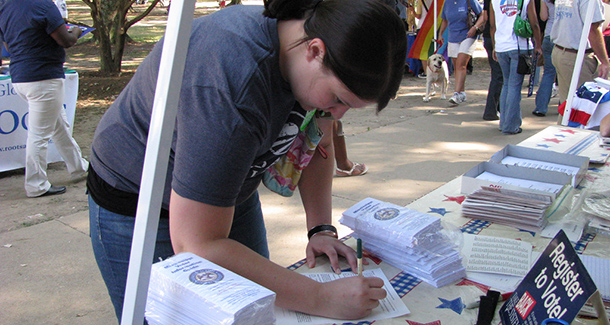
(Photo Credit: Natalie Maynor/Flickr)
Here’s a not-so-fun fact: 1.6 million fewer eligible Californians voted in 2012, compared to the 2008 Presidential election. That’s more people than those who voted in Alaska, the District of Columbia, North Dakota, Vermont, and Wyoming combined.
When the Future of California Elections (FoCE) Conference kicks off Thursday for a two-day gathering of election officials, civil rights organizations and election reform advocates, the Rock the Vote (RTV) organization will also be there, raising awareness about its efforts to boost Election Day turnout among voters between the ages of 18 and 29.
RTV’s Civic Technology Program Manager Jen Tolentino says the organization has several strategies for engaging young people in the voting process this year. One involves reaching out to them in the one place that’s most obvious: the classroom. Rock The Vote has even designed a curriculum for teachers to use.
“It’s about making sure there’s a curriculum in high school offering an overview of the importance of elections,” says Tolentino, who will be on a youth vote panel at the Conference (Read the program).
The theme of the 2016 FoCE Conference is “Building Partnerships for a Stronger Democracy,” and RTV plans to highlight its partnership with corporations as part of its ongoing efforts to encourage company leaders to showcase the importance of voting. Tolentino says RTV is zeroing in on companies with a high percentage of millennial workers.
“It’s about building a culture of voting wherever young people are so that it becomes ingrained in their everyday lives,” she says.
An analysis by the Center for Information and Research on Civic Learning and Engagement (CIRCLE) at Tufts University found that young voters in California represented 28 percent of the 2012 electorate — a fact CIRCLE attributes in part to California’s online voter registration system.
“In 2014,” Tolentino says, “we had a turnout rate of 53 percent of our users who registered through our own [online] tool, compared with a national turnout rate of 36 percent.”
And just last year, in a move lawmakers hope will drive more Californians to the polls, Governor Jerry Brown approved the “New Motor Voter Act.” legislation that automatically registers citizens to vote when they get or renew a driver’s license or state ID card.
According to California Secretary of State Alex Padilla, who sponsored the bill, an estimated 6.6 million Californians were eligible to vote when the bill was passed, but weren’t registered. The advocacy organization California Public Interest Research Group believes the motor voter law will likely have the greatest impact on young millennials.
Besides highlighting the importance of voter registration and turnout, RTV points out that young people are already having an impact on this year’s Presidential race, as evidenced by the increased amount of campaign time candidates spend discussing issues that are important to them.
“When candidates are focusing on issues that matter to millennials,” Tolentino says, “that also means they’ll be more excited about the candidates. It shows that both the public and candidates are paying attention to what young people want. Millennials have the same core issues as the general population but they do place a higher priority on education and gun control. In our survey [conducted in January] the top five issues for millennials were the economy, education, foreign policy and health care [followed by] gun laws and gun safety.”
“Consider student debt,” says Nick Charles, communications director for Rock The Vote. “[There wasn’t] a lot of conversation about it in 2008 or 2012. There’s a big conversation now. The candidate raising that kind of issue is getting a lot of applause from young people because they can’t do the things their parents were able to do: afford a home or start a family before they’re 30.”
And, despite a common perception made by their elders, Charles insists that young people are by no means apathetic.
“Sometimes they’re confused and sometimes frustrated,” Charles says. “I think the process for some people, particularly first-time voters, is not an easy one. Every state has different ways of running their registrations. There are different deadlines, different ways to find your polling places. What we at Rock The Vote have been trying to do for 25 years along with our partners is make the process less frustrating, less mystifying and make it easier in some respects.”
Besides the availability of online registration and the new motor voter provision, casting ballots by mail is another way California has made the road to voting easier. Rock The Vote is hoping the end result will be a noticeable boost in voter participation.
“Let’s be honest,” Charles says. “This is February, March. The folks who are engaged are the really super-engaged politically, socially and culturally. There are a lot of people out there who are waiting until the field is whittled down to two. There are also numerous state and local issues to consider, but once the national conventions are done at the end of July, I think you’ll see more focus on the presidential election in November.”
The 2016 FoCE Conference will be held at the California Endowment in Los Angeles on February 25-26.

